Though we cannot host our policy conference in person this year, we hope to provide the higher education policy community with some of the benefits of the annual conference and share some of the highly anticipated sessions that were scheduled to be presented in Indianapolis. SHEEO will hold the free virtual conference over ten weeks starting on Thursday, August 20. All sessions will be held on Thursdays, at 3 p.m. ET. Each week, we will host a 75-minute Zoom session featuring a stand-out session from our 2020 proposals.
Past Webinars
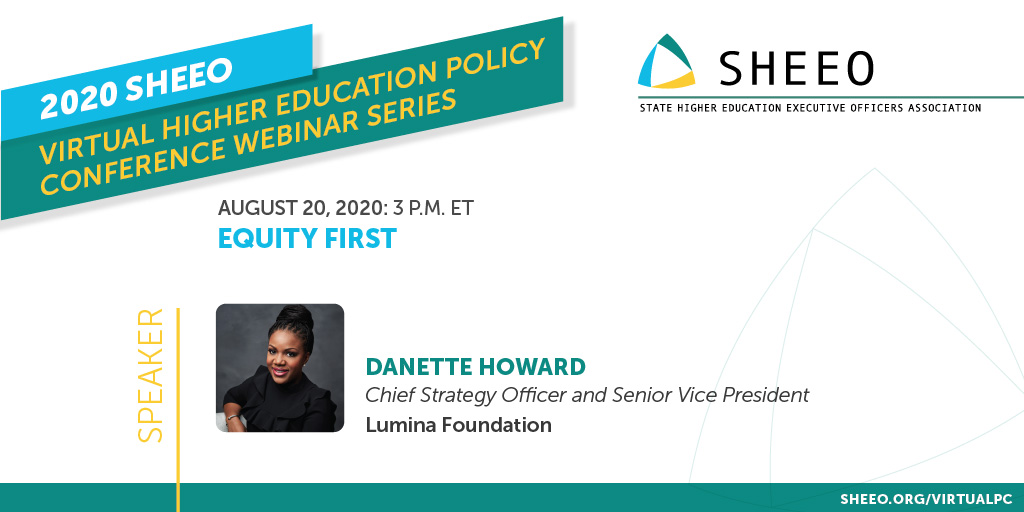
Speaker:
Danette Howard, chief strategy officer and senior vice president, Lumina Foundation
Danette Gerald Howard, Ph.D., is Lumina’s senior vice president and chief strategy officer. Howard oversees several of the foundation’s strategies aimed at increasing the number of adults who have college degrees, certificates, and other credentials of value, including state and federal policy outreach. She also leads Lumina’s efforts to mobilize and engage businesses, communities, colleges and universities, and other actors with stakes in education and training after high school.
Before joining Lumina, Howard served as secretary of higher education in Maryland, leading the Maryland Higher Education Commission. In that role, she oversaw Maryland’s statewide financial aid program, approved new academic programs and institutions seeking to operate in the state, and advised the governor and legislators on higher education policies and initiatives.
A nationally regarded analyst and leader, Howard previously served as director of research and policy analysis at the Maryland Higher Education Commission. She also served as assistant director of higher education policy at the Education Trust in Washington, D.C.; as a researcher at the University of Maryland, College Park; and as a student affairs administrator and admissions counselor at the University of Maryland, Baltimore County.
Howard earned her bachelor’s degree with highest distinction from Howard University, where she serves on the board of trustees. She also holds a master’s degree from the Harvard Graduate School of Education and a doctorate in higher education policy from the University of Maryland. In 2015, she was honored with Howard University’s Distinguished Alumni Achievement Award for her outstanding success and national distinction in the fields of education and policy.
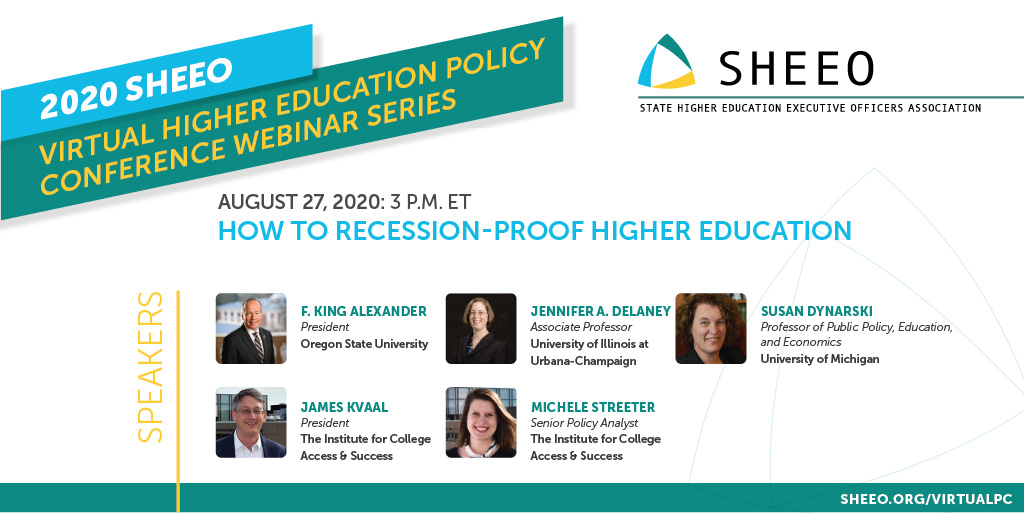
Session Description:
Even before the COVID-19 pandemic and related recession, state higher education funding had still not recovered from the effects of the Great Recession. To prevent a spike in tuition and a run-up in student debt, policymakers must act now to ensure that public colleges are adequately funded and prepared to weather both the current crisis and future economic downturns. The federal government is in a unique position to help ensure that states are in a better position to weather fluctuations in the economic cycle without making cuts to higher education spending.
Panelists will discuss why policymakers need to put a mechanism in place to ensure that the state funding cuts to higher education made during previous economic downturns are not repeated. Panelists will also share how this mechanism could work and how lawmakers could advance it.
Speakers:
F. King Alexander, president, Oregon State University
F. King Alexander became Oregon State University’s 15th president on July 1, 2020. Alexander is noted nationally for his strong advocacy of public higher education and has provided Congressional testimony on barriers to equal opportunity for college students, college affordability and the use of federal incentives to help reverse the decline in state support for public higher education. He previously served as president and chancellor of Louisiana State University, president of California State University Long Beach, and president of Murray State University in Kentucky.
Jennifer A. Delaney, associate professor of higher education, University of Illinois at Urbana-Champaign
Jennifer A. Delaney is an Associate Professor of Higher Education at the University of Illinois at Urbana-Champaign. Dr. Delaney is also a member of the Illinois Board of Higher Education. Previously, she worked for the Advisory Committee on Student Financial Assistance, the National Center for Public Policy and Higher Education, and served as a consultant for the Commission on the Future of Higher Education. She earned a Ph.D. in Higher Education Administration from Stanford University, an Ed.M. in Higher Education from Harvard University, and a B.A. in English from the University of Michigan.
Susan Dynarski, professor of public policy, education and economics, University of Michigan
Susan Dynarski is a professor of public policy, education and economics at the University of Michigan, where she holds appointments at the Gerald R. Ford School of Public Policy, School of Education, Department of Economics and Institute for Social Research and serves as co-director of the Education Policy Initiative. She is a faculty research associate at the National Bureau of Economic Research. Dynarski earned an A.B. in Social Studies from Harvard, a Master of Public Policy from Harvard and a Ph.D. in Economics from MIT. Dynarski’s research focuses on the effectiveness of charter schools, the optimal design of financial aid, the price elasticity of private school attendance, the relationship between postsecondary schooling and labor market outcomes, and the effect of high school reforms on academic achievement and educational attainment.
James Kvaal, president, The Institute for College Access & Success
James Kvaal is the president of the Institute for College Access & Success. He previously served as the deputy domestic policy adviser at the White House, where he worked on a range of issues related to economic opportunity. His work on higher education included initiatives to make college tuition more affordable, protect students from unaffordable loans, and help many more students graduate from college. Over the course of his career, he has also served in senior roles at the U.S. Department of Education, the U.S. House of Representatives, and the U.S. Senate. He has taught at the University of Michigan’s Ford School of Public Policy and attended Stanford University and Harvard Law School.
Michele Streeter, senior policy analyst, The Institute for College Access & Success
Based in TICAS’ Washington, D.C., office, Michele Streeter works on federal policy issues related to higher education access, affordability, and success. Her work focuses specifically on strengthening the Pell Grant program, improving the student loan system, and ensuring higher education is accessible and affordable for all students, including underrepresented students of color and low-income students. Prior to joining TICAS, Michele worked as the director of external affairs and communications for Education Finance Council (EFC), where she advocated for increased investments in grant aid, college access programs, and student-centered improvements to higher education financing and student loan repayment. Before EFC, Michele worked for the American Battlefield Trust, where she developed and implemented successful federal and state-based advocacy and communications campaigns related to historic preservation. Michele has a B.A. in history from Gettysburg College.
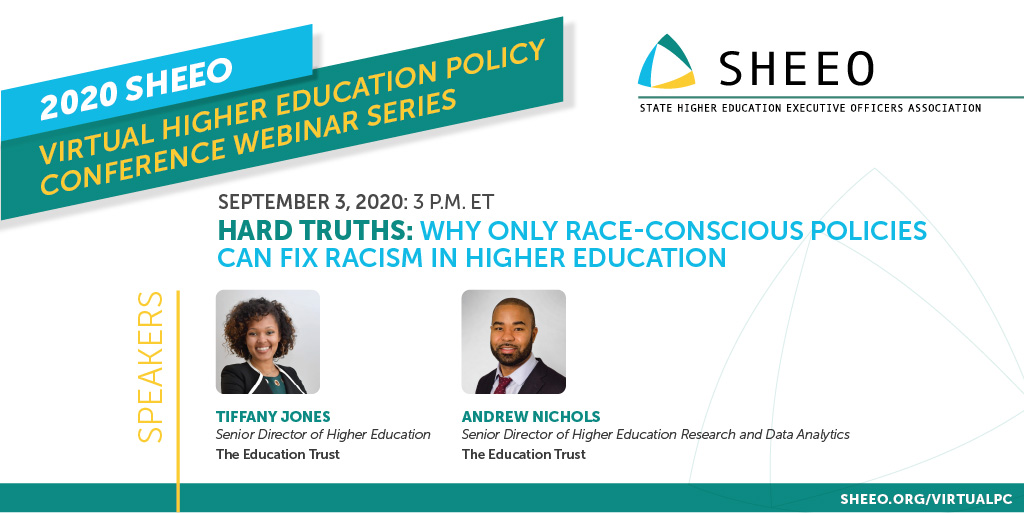
Session Description:
The purpose of this session is to discuss why race-conscious policies are necessary in higher education. The session will be based on data and research from The Education Trust’s State Equity Report Card and the policy brief, Hard Truths: Why Only Race-Conscious Policies Can Fix Racism in Higher Education. The authors will discuss arguments for why race-conscious policies that are designed to eliminate racism are necessary and share data that explains why a focus on income alone may not close gaps in opportunity and outcomes for students of color, particularly Black students and families. The authors will also offer 10 policy recommendations on how leaders and policymakers can design and implement race-conscious policies in higher education. The recommendations discussion will specifically highlight what policymakers can do to advance race conscious policies at the state level.
Speakers:
Tiffany Jones, senior director of higher education, The Education Trust
Tiffany directs the higher education policy team at The Education Trust, where she promotes legislation to improve access, affordability, and success for low-income students and students of color. Central to this work is supporting equity- and student-centered accountability and affordability policies at the state and federal levels. Tiffany and her team design and promote policy to make higher education more affordable, hold colleges accountable, and invest in student success. Tiffany advises federal and state policymakers, convenes national working groups of civil rights and ed reform advocates, and supports emerging equity coalitions in several states. Dr. Jones has published for public, policy, and academic audiences her recommendations on how higher education policy and practices impact college success for low-income students and students of color. Her work has been featured in places like the New York Times, CNN, and NPR, and in her book, Can Equity Be Bought? Outcomes Based Funding for Racial Equity, she introduces a framework for prioritizing equity issues in higher education accountability systems. Other recent publications include A Guide to Statewide Attainment Goals for Racial Equity Advocates, A Framework for Equitable Free College Programs, and Outcomes-Based Funding and Race in Higher Education. Before joining Ed Trust, Tiffany led the higher ed work at the Southern Education Foundation, where she partnered with Historically Black Colleges and Universities and Hispanic Serving Institutions to advance student success and engage in analysis of federal and state policies (such as performance- and outcomes-based funding) using an equity lens. Prior to her time at SEF, Jones was a dean’s fellow at the Center for Urban Education at the University of Southern California, where she helped advance the equity scorecard in Minority-Serving Institutions and urban high schools. A Michigan native, Tiffany holds a Ph.D. in Urban Education Policy from the University of Southern California, a master’s degree in Higher Education Administration from the University of Maryland, College Park, and a bachelor’s degree in Family Studies and English from Central Michigan University.
Andrew Nichols, senior director of higher education research and data analytics, The Education Trust
In his role as the senior director of higher education research and data analytics, Andrew helps develop a research agenda that identifies patterns and trends in college access, affordability, and success, with a keen focus on improving outcomes for underserved populations. Prior to joining The Education Trust, Andrew served as the director for research and policy analysis at the Maryland Higher Education Commission (MHEC). There he led the research division in developing and producing analytical and informational reports examining key higher education issues. Previously, Andrew worked at the Pell Institute for the Study of Opportunity in Higher Education, where his research focused on enhancing educational opportunity for low-income and first-generation college students. Andrew has co-authored several book chapters and peer-reviewed journal articles that have been published in the Review of Higher Education, Journal of College Student Development, and Teachers College Record. He holds a Ph.D. in higher education administration from Pennsylvania State University, a master’s degree from the University of Southern California and a bachelor’s from Vanderbilt University.
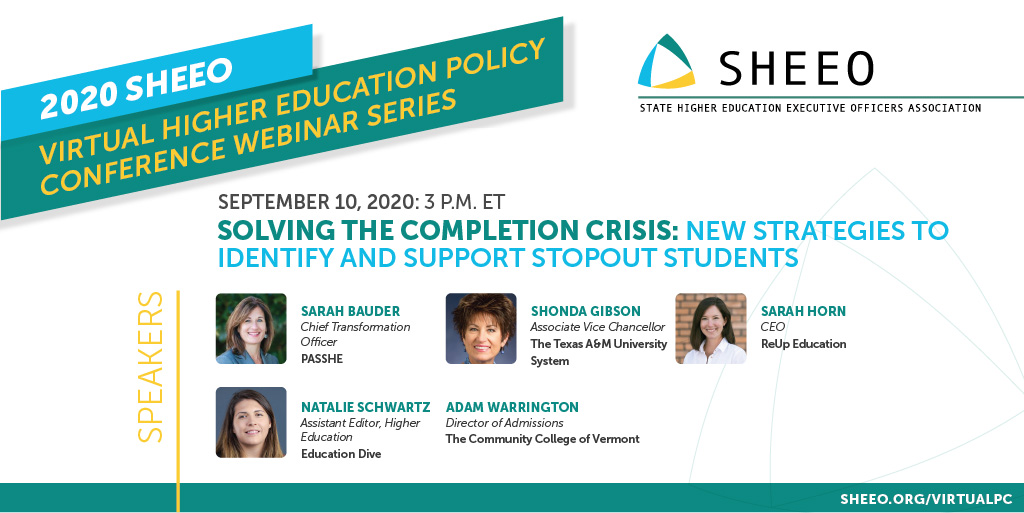
Session Description:
Nearly 40 million students in the United States have left college without receiving their degree—creating a “completion crisis” with profound social and economic implications. More than 40 percent of students who enroll in college leave without getting their degree, and according to a recent report from the National Student Clearinghouse, the country’s stopout population has increased by more than 7 million in the last five years alone. With the Bureau of Labor Statistics predicting that a growing number of jobs will require a bachelor’s degree in the coming decade, stopout students face ever-growing barriers to social and economic mobility. What causes students to leave college before completing their degree? For many, life gets in the way; issues from housing to transportation to childcare prevent even the most motivated students from successfully navigating their college experience. Addressing this challenge often begins with seemingly simple tasks, like identifying who stopout students are, in order to provide the support they need. And a growing number of state leaders are beginning to tackle this challenge with a combination of technology and the human touch. In Texas and Pennsylvania, new partnerships are helping to identify, support, and bring back stopout students—using predictive analytics to help experienced coaches and mentors understand when and how to engage. In this session, learn how two states’ approaches to college reentry is changing the game for stopout students. Panelists will discuss the way that new partnerships and technology tools can build capacity, provide ongoing support for students and staff, and help drive completion.
Speakers:
Sarah Bauder, chief transformation officer, Pennsylvania State System of Higher Education (PASSHE)
Sarah Bauder joined the State System as the Chief Transformation Officer in January, 2019. As the CTO, Sarah’s role is to harness organizational change and drive new growth, while operationalizing new ideas, spearheading innovation, and facilitating change. Prior to PASSHE, Bauder worked at the Bill & Melinda Gates Foundation where she was responsible for a $1.7 billion scholarship program and led the creation and launch of a $420 million program to support low-income, under-represented students. Bauder also served on the Postsecondary Success team developing strategies to drive campus-wide innovative change from college access to gainful employment. This expertise was developed during her 23 years of working in higher education at the University of Maryland where she implemented student success programs to help marginalized and underserved students graduate from college. Bauder’s passion, insights, and ability to unite disparate concepts into transformative innovation have gained the attention of a broad variety of stakeholders. Most notably, she has served on the Executive Board for the National Association of Federal Student Aid Administrators, testified before Congress on three occasions advocating for student aid reform, presented to Ben Bernanke and the Federal Reserve Board of Governors, served as a representative for four-year public institutions on both President Bush and President Obama’s Higher Education task force for redundant and burdensome regulations, and was elected three times to serve on the Negotiated Rulemaking team. Sarah has traveled globally to China, Australia, and Dubai, collaborating with officials on the development of programs designed to uplift marginalized and underrepresented citizens for economic development and growth. She also volunteers as an advisor for business philanthropists, most recently in Doha and Saudi Arabia, in the creation of unique and impactful scholarship programs for those regions. Bauder holds a Master of Arts with honors from University of Maryland, College Park in Policy, Planning and Leadership and a bachelor’s degree with honors from St. Mary’s College of Maryland in Language and Literature. Sarah has been actively engaged in the community by serving on the Executive Board of Generation Hope, the Advisory Board for the Smith School of Business, and the Advisory Board for the Hispanic Scholarship Fund.
Shonda Gibson, associate vice chancellor, The Texas A&M University System
Dr. Shonda Gibson is passionate about students and about the life-changing impact of education. With over 25 years of corporate and industry experience in the fields of leadership, operations management, recruiting, training and team development, she brings a continuous improvement philosophy to approaching both student and university success. Dr. Gibson is a champion for the student-ready university—wherever level of leadership takes relentless ownership of our graduates’ effectiveness, continuously evaluating our practices to ensure all are fully prepared to thrive! Dr. Gibson joined The Texas A&M University System as Associate Vice Chancellor for Academic Affairs in 2018. The Texas A&M University System is one of the largest systems of higher education in the nation, with a statewide network of 11 universities and eight state agencies, serving more than 153,000 students and making more than 22 million additional educational contacts through service and outreach programs each year. The A&M System Office of Academic Affairs provides leadership and support over academic programs, educational initiatives, academic policy, student affairs, digital learning and data analysis. The office also supports several special initiatives and provides guidance in the areas of collaboration and other outreach activities. Dr. Gibson provides executive leadership and direction in academic-related areas and initiatives, including the academic program development process for A&M System members; ensuring the development of quality measures for success; providing system-wide leadership for academic technology initiatives; fostering communication and coordination between system members; and working with system members on identifying common issues and seeking solutions. Dr. Gibson has served in a variety of higher education roles, including: Executive Director of the Texas Institute for Competency Based Education; Accreditation Liaison for the Commission on Colleges of the Southern Association of Colleges and Schools; Interim Vice President for Student Access and Success; Executive Director for Institutional Effectiveness and Research; Executive Director for Global Learning and Quality Enhancement; and adjunct faculty in the College of Business, and College of Education and Human Services. She holds multiple degrees through The Texas A&M University System, including a bachelor’s degree, a Master of Business Administration with dual concentrations in management and economics, a Master of Science in Psychology with a cognate focus on management, and a Doctor of Philosophy in Educational Psychology through Texas A&M University-Commerce. She is passionate about travel and exploring unique destinations, sampling diverse cuisines, and cooking for and with family and friends.
Sarah Horn, CEO, ReUp Education
Sarah Horn has spent her entire career in higher education, focused specifically on strategies that drive student success and improve student outcomes. For more than 15 years she has created, implemented, and managed student retention solutions at dozens of colleges and universities across the country. From 2013-2016, Sarah led the Retention Services division at Helix Education, and her team coached thousands of students. They saw up to a 5 percent annual retention improvement at their university partners. At Altius Schools, she managed the retention division for associate degree-seeking students. Under her guidance, students successfully transferred or graduated at a rate of 65 percent—compared to a national benchmark of 28 percent. At the beginning of her career, Sarah was a Success Coach at InsideTrack and eventually led one of the largest teams in the company. Sarah has been invited to present her work at Educause, APSCU, UPCEA, NSSR, and CampusTech.
Natalie Schwartz, assistant editor, higher education, Education Dive
Natalie Schwartz is a reporter for Industry Dive’s Education Dive: Higher Ed publication and is based in Washington, D.C. She graduated from the University of Maryland in 2017 with degrees in journalism and English. She reported on crime in southeastern Louisiana before moving back to her hometown in Maryland to cover higher education. Natalie’s work covers the intersection of higher education and innovation, with a focus on the way that institutions are employing new strategies to serve an increasingly diverse, nontraditional student population.
Adam Warrington, director of admissions, The Community College of Vermont
Adam Warrington is the Director of Admissions at the Community College of Vermont (CCV) which has 12 Academic Centers throughout the state and is a member of the Vermont State Colleges System (VSCS). He also serves as the chairperson for the VSCS (including CCV, Castleton University, Northern Vermont University, and Vermont Technical College) Admissions Leadership Team. Adam has played a primary leadership role in all the VSCS’s partnership with ReUP since 2019.
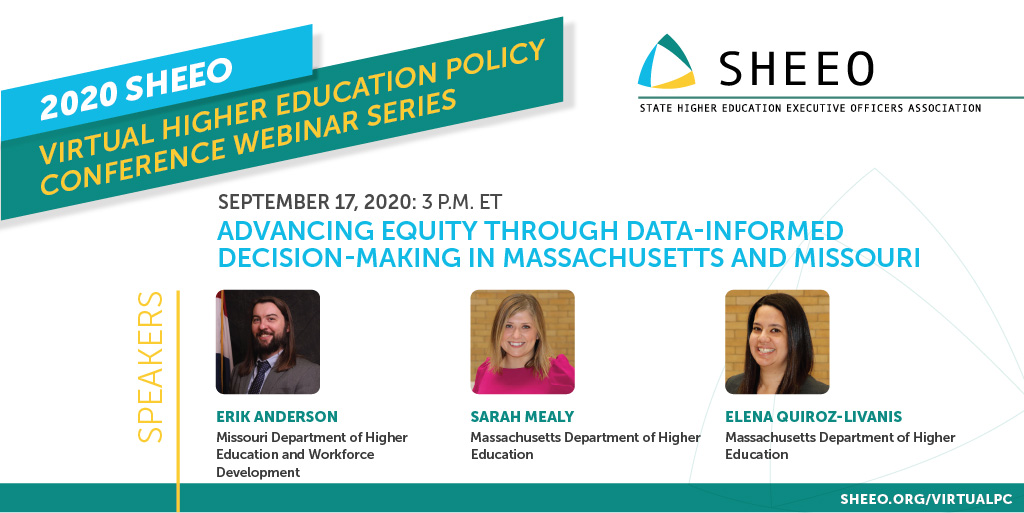
Session Description:
Colleagues from the Massachusetts Department of Higher Education and the Missouri Department of Higher Education & Workforce Development will present on efforts to use high-quality data to advance equity efforts to improve postsecondary outcomes for minoritized students. Session attendees will have the opportunity to participate in a hackathon where they will be guided through critical questions to examine their own state-level data. Panelists will also engage in an open dialogue regarding lessons learned in advancing equity in higher education and promising practices for building trusting relationships with postsecondary institutions as they work to improve outcomes for students from minoritized populations.
Speakers:
Erik Anderson, director of innovation and performance, Missouri Department of Higher Education and Workforce Development
Erik Anderson is the Director of Innovation and Performance with the Office of Postsecondary Policy for the Missouri Department of Higher Education and Workforce Development, where he facilitates work on the Missouri Math Pathways Initiative and remedial education, including co-requisite models of remediation. A Missouri native, Erik earned his undergraduate degree in Anthropology from Brigham Young University and his Master’s in Anthropology and Education from Columbia University. Before joining the MDHEWD in 2014, Erik taught middle school in rural Mississippi with Teach for America and worked for the Office of Disability Services at Columbia University.
Sarah Mealey, assistant commissioner for analytics & digital services, Massachusetts Department of Higher Education
Sarah Mealey is a communications, design and technology expert who crafts data-informed stories that communicate clearly to stakeholders and advance policy goals. Currently Assistant Commissioner for Analytics & Digital Services, she has spent her entire career at the Massachusetts Department of Higher Education (DHE) in a progression of roles developing and overseeing the DHE’s website, annual reports, email and print marketing, and data analytics initiatives. Her work on the DHE’s publications and website have earned her three citations for outstanding performance from the Governor of Massachusetts. Sarah holds a BFA in graphic design from Massachusetts College of Art and Design.
Elena Quiroz-Livanis, assistant commissioner for academic policy & student success and chief of staff, Massachusetts Department of Higher Education
Elena Quiroz-Livanis is the Chief of Staff and Assistant Commissioner of Academic Policy & Student Success at the Massachusetts Department of Higher Education. She oversees efforts to create a unified system of transfer and transform developmental education. Most recently, Quiroz-Livanis has begun working with Commissioner Carlos Santiago under the direction of the Board of Higher Education to develop a system-wide strategic plan focused on equity. The framework seeks to significantly raise the enrollment, attainment, and long-term success outcomes among African American and Latinx student populations. Quiroz-Livanis is also a doctoral student in the Higher Education program at UMass Boston.
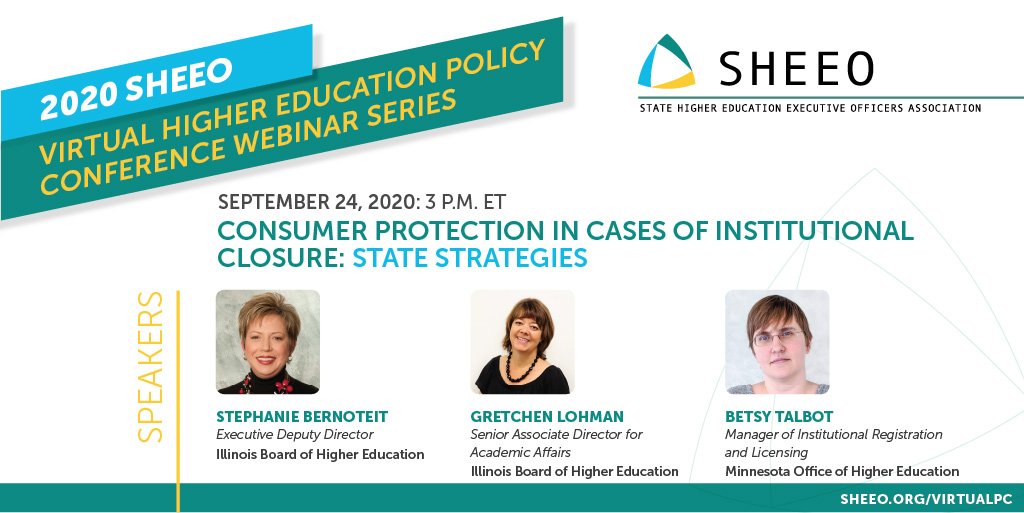
Session Description:
Increasing volatility in the higher education sector has resulted in a growing number of institutions undergoing changes of control and closure. The effects of institutional closure on students, faculty, staff, and communities are profound; and in cases where closure is precipitous, the consequences are particularly problematic. The presenters will address the role of the state higher education agency in setting state-level policies and conditions to identify and leverage early warning indicators of institutional viability, protect students in cases of institutional closure, and support institutions in being effective teach-out partners. Particular attention will be paid to the importance of collaborative efforts with members of the Triad, other state agencies, as well as licensure and specialized accrediting bodies. Presenters will provide examples from the states of Illinois and Minnesota and engage participants in a discussion of issues and strategies.
Speakers:
Stephanie Bernoteit, executive deputy director, Illinois Board of Higher Education
Stephanie Bernoteit oversees the agency’s regulatory work with approximately 450 postsecondary institutions and is responsible for the agency’s initiatives to promote postsecondary student success and workforce development. Dr. Bernoteit leads a collaborative team of multiple Illinois agencies focused on postsecondary students and related consumer protection issues and serves on the Higher Learning Commission’s Quality Awareness Initiative on Students’ Right to Know. Stephanie holds a B.S. in Elementary Education from Northwest Missouri State University, an M.S. in Curriculum and Teaching Management from Drake University, and an Ed.D. in Curriculum and Instruction from Illinois State University.
Gretchen Lohman, senior associate director for academic affairs, Illinois Board of Higher Education
Gretchen Lohman oversees the review of more than 100 Illinois institutions and their programs, manages institutional closures, and leads with the agency’s dual credit and teacher credentialing initiatives. Dr. Lohman is lead author on an IBHE paper also published by the Higher Learning Commission on the role of state agencies in cases of institutional closure. Gretchen holds a B.S. in personnel/human resource management from the University of Northern Iowa, an M.S. in counseling education from the University of Iowa, and a Ph.D. in higher education administration from Bowling Green State University.
Betsy Talbot, manager of institutional registration and licensing, Minnesota Office of Higher Education
Betsy Talbot is Manager of Institutional Registration and Licensing for the Office of Higher Education, the SARA Portal Entity for Minnesota, and the Chair of MHEC’s Regional Compact Committee for SARA. She is responsible for the oversight of postsecondary schools, including state authorization and student consumer protections, coordination between members of the triad, policy guidance for postsecondary regulation in Minnesota, and coordination between schools, the community, and students in the event of a school closure. She hold a B.S. from College of Charleston, a Master’s in Education in Post-Secondary Education from Argosy University, and Juris Doctorate from Seattle University.
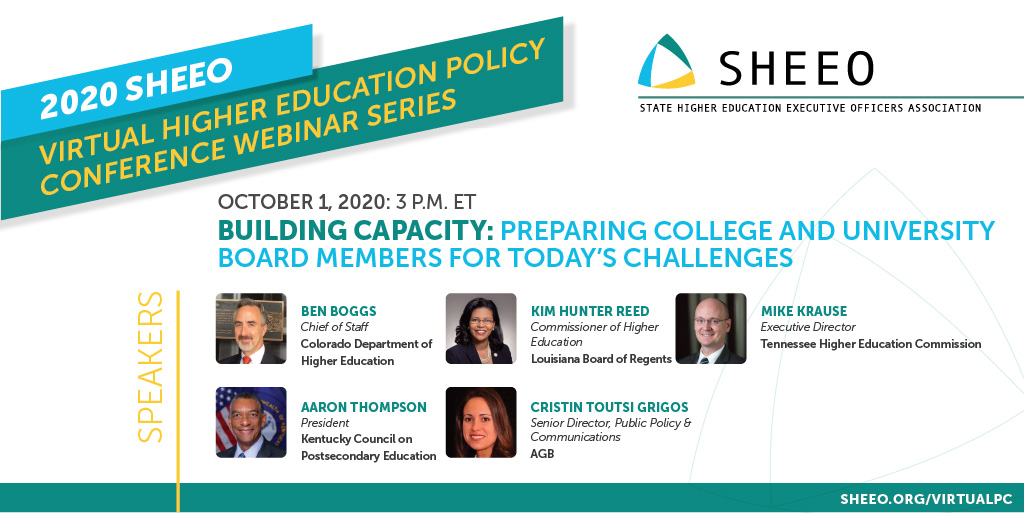
Session Description:
Governing and coordinating public higher education systems, agencies, and institutions is demanding work that requires well-prepared leaders ready to address challenges and seize opportunities. These leaders face increased demands for more students with some form of quality postsecondary education at a time when the public is questioning the value of higher education due to concerns about access, affordability, quality, and ROI, among others.
This session focuses on the role of higher education governing and coordinating board leaders, and state-level education programs that improve governance, oversight, and leadership. These programs can better prepare board members to strengthen the higher education enterprise and develop policies and practices that address state issues and needs. This discussion explores the impact of these convenings. Panelists will address questions like:
- What can states do through these programs that they wouldn’t be able to do otherwise?
- How can these programs expand to include more higher education leaders, elected officials, and other partners such as K-12 officials or business executives?
- How do these programs offer opportunities to discuss state master plans, goals for higher education, or new legislation impacting institutions and institutionally-related foundations?
- In light of the current environment, what are some ways that states are holding these programs virtually?
Speakers:
Cristin Toutsi Grigos, senior director, public policy & communications, AGB
Cristin Toutsi Grigos is the senior director of public policy and strategic communications at the Association of Governing Boards of Universities and Colleges. Cristin holds a master’s degree in higher education from the College of William & Mary and baccalaureate degrees in political science and governmental administration with a minor in leadership studies from Christopher Newport University.
Kim Hunter Reed, commissioner of higher education, Louisiana Board of Regents
Kim Hunter Reed, Ph.D. is Louisiana’s Commissioner of Higher Education. She is the only female in the country currently serving as a state higher education lead who has led higher education in more than one state. Working with the Louisiana Board of Regents, Reed is leading the state’s efforts to increase educational attainment by developing its talent base resulting in a more prosperous Louisiana that seeds innovation, grows opportunity and secures a bright economic future. To reach the state’s goal of doubling the number of credentials by 2030, Reed focuses on collaborative efforts that increase access, equity and completion to meet Regents’ talent imperative.
Aaron Thompson, president, Kentucky Council on Postsecondary Education
Dr. Aaron Thompson is a passionate advocate for higher education. As a first-generation college student from rural Clay County, Kentucky, he experienced firsthand the transformative power of a college credential. As President of the Kentucky Council on Postsecondary Education, he works to ensure all Kentuckians have an equal opportunity to improve their lives through postsecondary education. Before taking the helm of CPE, Thompson served as interim president of Kentucky State University and as executive vice president, provost, and faculty member at Eastern Kentucky University. He has extensive leadership experience within the private and non-profit sectors and is a highly sought-after national speaker. Dr. Thompson has authored or co-authored numerous books and peer-reviewed publications on diversity, cultural competence, first-year experience programs, retention, and student success, among other topics. In 2019, he was inducted into the Kentucky Civil Rights Hall of Fame. Thompson received his doctoral degree in sociology from the University of Kentucky, with an emphasis on organizational leadership. He earned a master’s degree in industrial sociology from the University of Kentucky, and a bachelor’s degree in political science from Eastern Kentucky University.
Ben Boggs, chief of staff, Colorado Department of Higher Education
Dr. Ben Boggs is the chief of staff at the Colorado Department of Education. He previously served as program principal for the National Conference of State Legislatures. Boggs earned his Ph.D. in higher education policy studies from the University of Virginia, a Master of Education degree in higher education from the College of William & Mary, and a bachelor of arts degree in psychology from Wake Forest University.
Mike Krause, executive director, Tennessee Higher Education Commission
Mike Krause serves as the Executive Director of the Tennessee Higher Education Commission and Tennessee Student Assistance Corporation. Prior to assuming this role, he served as the founding Executive Director of the Tennessee Promise and Drive to 55, where he coordinated the launch of the nation’s first free community college program and an array of other programs focused on increasing state higher education attainment. Krause also served for eight years in the U.S. Army and Tennessee Army National Guard, where he completed three combat tours with the 101st Airborne Division and was awarded the Bronze Star Medal during Operation Iraqi Freedom. An eighth generation Tennessean, Mike earned his bachelor’s degree from Austin Peay State University and Master’s in Public Policy from Vanderbilt University.
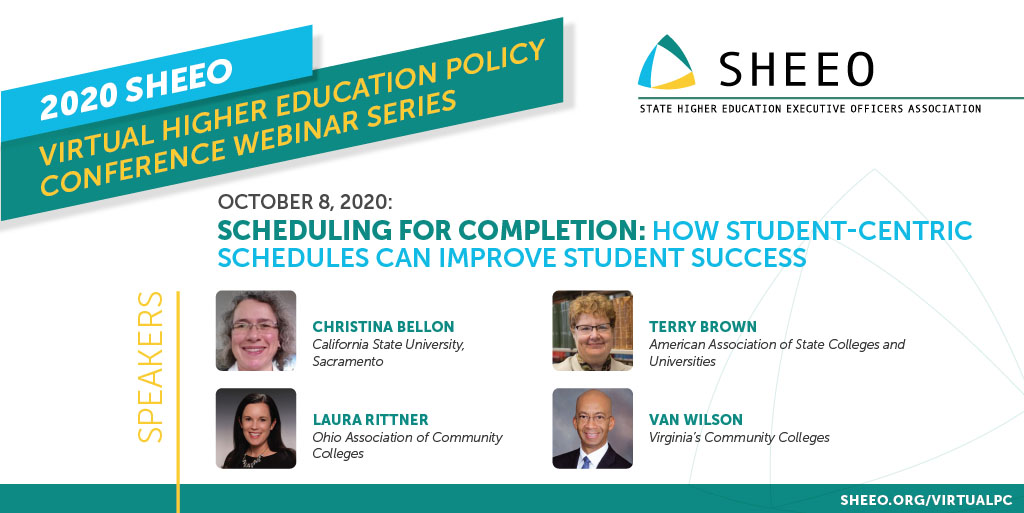
Session Description:
More and more of today’s students are working and/or parents. For these students, higher education is one of multiple competing priorities in their lives, including taking care of family and/or earning a sustaining wage. For these students, the biggest barrier to academic success is often time, and institutions often exacerbate this issue by not prioritizing these students in scheduling. This results in students struggling to get the courses they need at the times and in the sequence they need. Meanwhile, more than two-thirds of courses are either underfilled or overfilled, presenting bottlenecks that prevent students from taking the courses they need to progress. This session will explore how policymakers and institutions can ensure the academic schedule is aligned to students’ needs to improve student success. Sacramento State University is increasing access to courses that were consistently the most bottlenecked by moving to strategic student-centered scheduling. The institution is already seeing tremendous success, increasing its four-year graduation rate from 8.5% to 14.7% in just three years. Over the past few years, Ohio has implemented policy to improve address affordability and efficiency, which have driven interest in the schedule as a tool to improve student success. Through a two-year grant from the state, Ohio’s community colleges have utilized student-centric schedules to implement guided pathways and improve space utilization all while improving institutional revenues. Lastly, this session will look at the role of culture and change management in setting the academic schedule around students’ needs while also balancing the needs of faculty. This will include how associations, like AASCU, can drive change and scale the number of institutions that are using the schedule to drive best practices.
Speakers:
Terry Brown, vice president of academic innovation and transformation, American Association of State Colleges and Universities
Terry brings with her more than 20 years of leadership and higher education experience, most recently as the provost and vice president for academic affairs at the SUNY Fredonia. As a first-generation college student, Terry is committed to student success and spearheaded several efforts to increase college completion. She previously served as a faculty member and associate dean at UW-River Falls, where she also was the first chair of AASCU’s American Democracy Project. Terry holds a Ph.D. in English from the University of Florida and a B.A. in English with a minor in biology and an M.A. in English from Virginia Tech.
Christina Bellon, associate dean for budget and assessment, College of Arts & Letters, California State University, Sacramento
Christina Bellon oversees the College’s budget and instructional resources, including enrollment management, space allocation and utilization, schedule management, assessment, and accreditation processes, and contributes to the development and oversight of the College’s Student Success Center, Four Year Promise Program, and Completion BA.
Laura Rittner, executive director of the student success center, Ohio Association of Community Colleges
Laura Rittner serves as Executive Director of the Ohio Association of Community Colleges’ Student Success Center. In this role she oversees the OACC’s student success initiatives including grants for Ohio’s Completion by Design statewide policy and scaling work, the Student Success Leadership Institute, and the AmeriCorps College Completion Coaches. Laura joined the OACC in 2013 as Director of Research & Data Analysis. She previously worked for Lakeland Community College in Kirtland, OH as Director for Institutional Research. Laura holds a Bachelor of Arts in Political Science and Psychology from Miami University in Oxford, OH and a Master of Public Policy from The George Washington University in Washington, DC.
Van Wilson, associate vice chancellor for student experience and strategic initiatives, Virginia’s Community Colleges
Dr. Van C. Wilson, Associate Vice Chancellor for Student Experience and Strategic Initiatives has over 35 years of experience in post-secondary education. He joined Virginia’s Community Colleges (VCC) Academic & Workforce Programs staff in January of 2013 and currently serves as the chief student services administrator for the system. This includes providing leadership in the areas of enrollment management, the Student Success Center and Office of Professional Development, special events and planning, credit for prior learning, admissions, registration, student leadership, financial aid, veteran’s services, library services, the early alert system and the Virginia Education Wizard, the system’s on-line educational portal. His current priorities includes working with VCC to accelerate educational attainment for military veterans by developing system-wide methodologies to evaluate and award academic credit for military educational experiences, the implementation of several system-wide technologies to support student success, teaching, and learning, and seeking system wide solutions to address student housing and food insecurity barriers.
Prior to joining VCC, Dr. Wilson served as Associate Vice President for Student Learning and Success for the North Carolina Community College System. He also worked as Vice President for Student Services at Forsyth Community College located in Winston-Salem North Carolina and held leadership positions at Winston-Salem State University and Western Carolina University.
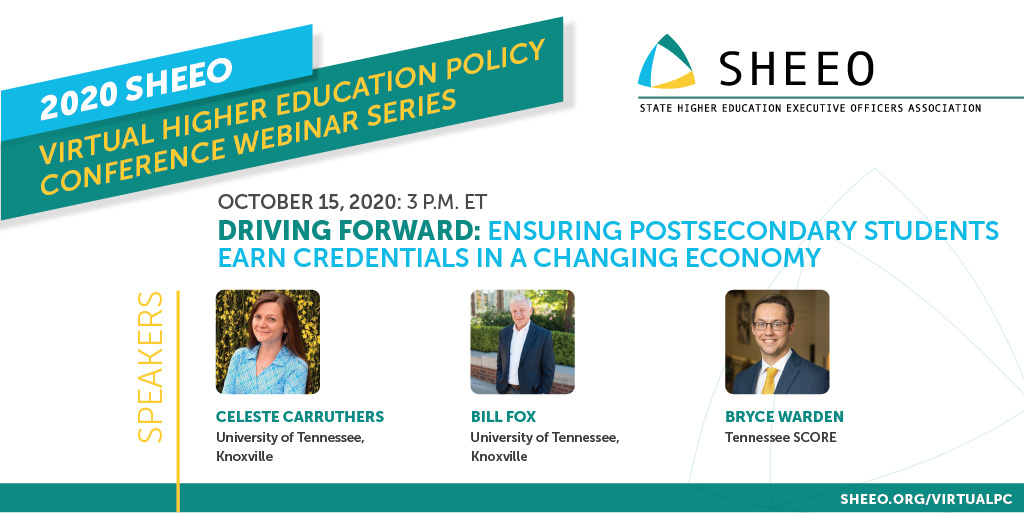
Session Description:
The Tennessee State Collaborative on Reforming Education (SCORE) and the University of Tennessee, Knoxville’s Boyd Center for Business and Economic Research co-present their research report that examines how the last two economic recessions affected postsecondary education and the workforce in Tennessee, as well as what insights we can learn from these recessions to consider a way forward in the COVID-19 context. The common thread: what do these things mean for students? SCORE and the Boyd Center will present policy considerations to address the current crisis, and provide a summary of how other states can conduct similar research and analysis with publicly available data.
Speakers:
Celeste Carruthers, associate professor of economics and James and Joanne Ford Faculty Research Fellow, University of Tennessee, Knoxville
Celeste Carruthers is an associate professor in the Haslam College of Business at the University of Tennessee with a joint appointment in the Department of Economics and the Boyd Center for Business and Economic Research. Her research centers on education policy with crossovers into public economics, labor economics, and economic history. Recent and ongoing projects examine the effect of financial aid on college choices, career and technical education, and the consequences of segregated schools in the early 20th-century United States. She teaches graduate and undergraduate courses in public expenditure analysis, causal inference, and econometrics. Carruthers is the Editor-in-Chief of Economics of Education Review, a former member of the Association for Education Finance and Policy Board of Directors, and a member of the CTE Research Network at the American Institutes for Research.
Bill Fox, chancellor’s professor and director of the Boyd Center for Business and Economic Research, University of Tennessee, Knoxvillle
Bill Fox is a Chancellor’s Professor, the Boyd Distinguished Professor of Business, and Director of the Boyd Center for Business and Economic Research at the University of Tennessee. He is a past President and recipient of the Steven D. Gold Award from the National Tax Association. He has held visiting appointments as Professor at the University of Hawaii, scholar at the Federal Reserve Bank of Kansas City, and Distinguished Fulbright Chair at the University of Frankfurt, Germany. Fox has served as a consultant on a wide range of public policy issues in over 40 countries and 15 U.S. states.
Bryce Warden, senior postsecondary policy analyst, Tennessee SCORE
Bryce is a senior postsecondary policy analyst at the Tennessee State Collaborative on Reforming Education (SCORE), where he leads postsecondary policy development and legislative analysis, with a focus on improving student outcomes through research and advocacy efforts. Prior to joining SCORE, Bryce managed the research and policy work of the Tennessee Educational Equity Coalition. He began his career with AmeriCorps VISTA at the University of Mississippi’s School of Education, where he designed and implemented various college access programs for rural, underserved students in north Mississippi. Bryce holds bachelor’s degrees in international studies and Spanish and a master’s degree in public policy from Vanderbilt University.
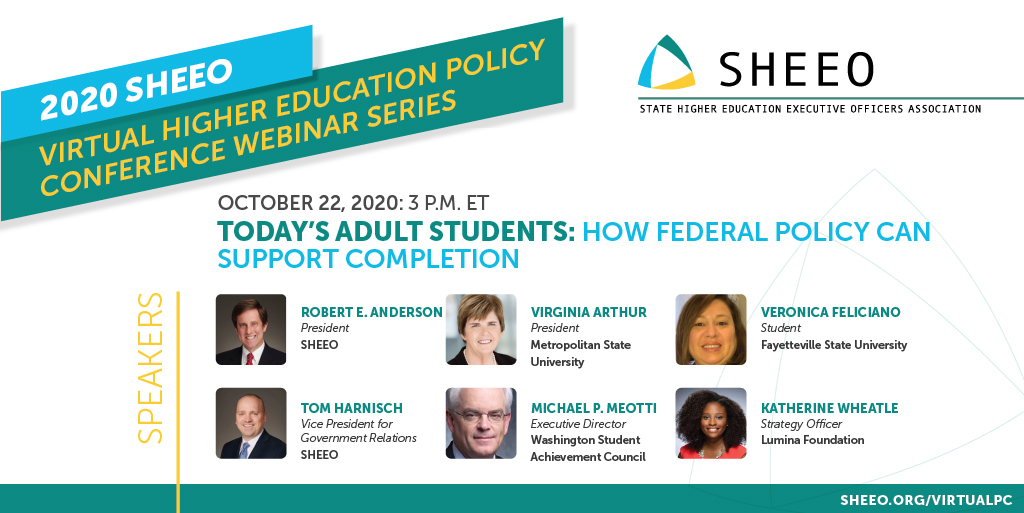
Session Description:
Forty percent of today’s undergraduate students are 25 years or older. However, so many of our education policies put up barriers for adult students rather than help them be able to complete their degrees or certificate programs. As more adult students enroll or re-enroll in postsecondary education while our country faces an economic crisis, we hope you will join us for an online discussion about how federal education policy can provide supports for today’s adult students to ensure they can be successful and prepared to enter the workforce.
Speakers:
Robert E. Anderson, President, SHEEO
Robert E. Anderson became president of SHEEO in August 2017. In this role, Dr. Anderson provides strategic leadership for the association and is an essential member of the broader higher education community and a strong and vehement advocate for public policy that addresses the postsecondary needs of all. Prior to accepting the appointment at SHEEO, Dr. Anderson served as a vice chancellor at the University System of Georgia, executive vice chancellor for administration at the West Virginia Higher Education Policy Commission, and as the director of research and planning at the Tennessee Higher Education Commission. A native of Augusta, Georgia, Dr. Anderson holds degrees from The Citadel (B.A.), The Southern Baptist Theological Seminary (M.Div.), and the University of Georgia’s Institute of Higher Education (Ph.D.).
Virginia Arthur, President, The Metropolitan State University
Virginia (Ginny) Arthur became the seventh president of Metropolitan State University, a member of the Minnesota State Colleges and Universities, on July 1, 2016. She joined Metropolitan State in 2012 as provost and executive vice president. During her tenure, the university has completed a strategic plan focused on educational equity, forged baccalaureate completion partnerships with the ten two-year colleges located in the Twin Cities metropolitan area, opened the Jason R. Carter Science Education Center and a student center, expanded programs in the Natural Sciences and Cybersecurity, strengthened faculty development, and expanded online learning. Metropolitan State is #35 on CollegeNet’s 2019 Ranking of Social Mobility.
President Arthur serves on the Board of the American Association of State Colleges and Universities (AASCU), the Executive Committee of the Coalition of Urban and Metropolitan Universities (CUMU), the Boards of MN-IA Campus Compact, Communidades Latinas Unidas En Servicio (CLUES), the Central Corridor Anchor Partnership and Black Men Teach.
In 2019, she was honored as one of 50 Women in Business in the Twin Cities by the Minneapolis Saint Paul Business Journal and as one of AARP’s 50 over 50 in 2020.
Previously, Arthur served the University of Northern Iowa as associate provost for faculty affairs from 2009 to 2012, and the College of Saint Benedict and Saint John’s University from 1985 to 2009 as a faculty member in business law and strategy for 24 years, seven of those as chairperson of the Management Department.
Arthur holds a bachelor’s degree in economics and business administration from Syracuse University and a juris doctor (JD) degree from the Washington College of Law at American University. She has presented at numerous conferences and authored dozens of publications.
Veronica Feliciano, Student, Fayetteville State University
Veronica Feliciano is a senior at Fayetteville State University where she is majoring in business administration and volunteers as the student advisor for the Office for Adult Learners at Fayetteville State.
Ms. Feliciano’s interest in business intelligence and data analytics began while serving as the Paratransit Operations manager for the City of Fayetteville, NC. During her 10 years in public service, Ms. Feliciano was inspired to increase accessible transportation for her customers. She learned the importance of using measurable data and public policy to advocate for citizens utilizing programs under the Americans with Disabilities Act. Ms. Feliciano partnered with the Cumberland County Disabilities Commission, the Fayetteville Area Committee on Transit (FACT), and served as a board member on the Fayetteville Veterans Administration Transit Advisory Board.
Ms. Feliciano served 10 years active duty in the United States Army and retired with 20 years of honorable service from the United States Army Reserve. She held various leadership positions throughout her military career. Ms. Feliciano is also a small business owner in Cumberland County, NC.
Tom Harnisch, Vice President for Government Relations, SHEEO
Dr. Tom Harnisch joined SHEEO in January 2020. As vice president for government relations, Dr. Harnisch is located in Washington, D.C., where his primary leadership responsibility is planning, implementing, and coordinating SHEEO’s portfolio of federal relations, policy, communication, and advocacy work. He monitors new and potential federal action (legislation, rules, and other policies and actions) that have relevance for our membership. Dr. Harnisch is responsible for bringing these issues to the attention of SHEEO staff and SHEEO’s membership and for articulating their potential impact on our members and the institutions and students they serve.
From 2007 to 2019, Dr. Harnisch worked in a series of roles at the American Association of State Colleges and Universities (AASCU), including as director of state relations and policy analysis. In his role at AASCU, his roles included policy research, analysis, and communication to the AASCU membership and other external stakeholder groups. He helped craft the AASCU Public Policy Agenda and planned the Higher Education Government Relations Conference. His research interests and commentary on higher education finance, access, affordability, and other topics have been cited in over 200 articles, including The New York Times, The Washington Post, Politico, Inside Higher Ed, and The Chronicle of Higher Education. He is also an adjunct faculty member at Georgetown University and The George Washington University. Dr. Harnisch earned a bachelor’s degree from the University of Wisconsin-Madison, a master’s from the University of Minnesota, and a doctorate from The George Washington University.
Michael P. Meotti, Executive Director, Washington Student Achievement Council
Governor Jay Inslee appointed Michael Meotti to serve as the executive director of the Washington Student Achievement Council (WSAC) in 2016. Mr. Meotti works with partners across higher education, elected officials, employers, and community-based groups to increase student access and success.
In 2019, the state launched the nationally recognized Washington College Grant program. As executive director, Mr. Meotti led WSAC to provide higher education policy and program expertise in support of this historic investment.
Mr. Meotti is a member of the executive committee of the State Higher Education Executive Officers Association (SHEEO). He frequently speaks before national audiences on higher education, equity, workforce development, and economic competitiveness issues. The U.S. Senate Committee on Health, Education, Labor, and Pensions invited him to testify on increasing access to college financial aid.
Mr. Meotti has extensive experience in higher education policy, finance, and innovation. Before joining WSAC, he consulted on higher education initiatives supported by national foundations and worked on regional and state strategies to increase student access and success. Mr. Meotti has also served in leadership positions in city and state government, nonprofit organizations, and corporations. He previously served as commissioner of the Connecticut Department of Higher Education and Executive Vice President of the Connecticut Board of Regents for Higher Education. Mr. Meotti holds bachelor’s and law degrees from Georgetown University, and he has taught policy analysis and higher education policy graduate courses at George Washington University and Trinity College.
Katherine Wheatle, Strategy Officer, Lumina Foundation
Katherine Wheatle, Ph.D., is a strategy officer for federal policy and equity in the Washington, D.C., offices of Lumina Foundation, an independent, private foundation in Indianapolis that is committed to making opportunities for learning beyond high school available to all.
Before joining Lumina, she served as a research analyst at the Institute for Higher Education Policy and as a research associate at the Center for Postsecondary Research at Indiana University, and consulted for the Office of Postsecondary Education at the U.S. Department of Education. Her past work has included examining how the Higher Education Act interacts with minority-serving institutions and how finance and financial aid policies can affect these institutions.
Wheatle holds a bachelor’s degree in African and African American studies from Pennsylvania State University, a master’s in health policy and health service research from Emory University, and a doctorate in higher education from Indiana University.
